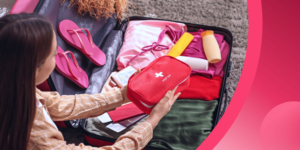Your study abroad journey is full of opportunities: new friends, unique food, and interesting places to explore. As an international student, you’re starting a new chapter in your life, and managing your money is key to making the most of it. By planning ahead and making smart choices, you can make your budget go further and still have an amazing experience.
This guide shares eight simple tips that can help you save money as an international student, no matter where you study. From your first week to your last, these strategies will help you enjoy your time abroad with less financial stress.
Concerned about how you’ll finance your international education? Learn more about ApplyBoard’s flexible student loans.

1. Make a Budget and Stick to It
Creating a budget is the most important step for financial success. Think of your budget as a roadmap for your money. First, list all your sources of income including scholarships, savings, or money from your family. Then, list your fixed expenses—your costs that don’t change each month—like tuition fees, rent, and phone bills. Consider adding a small fixed amount to your budget each month as an emergency fund to help cover unexpected bills.
After writing down your fixed costs, focus on your flexible expenses. These include groceries, entertainment, travel, and shopping. These expenses are where you can save the most. Use a simple spreadsheet or a budgeting app to track every dollar you spend. Do this for a couple of months, as your spending will vary (for example, it might go up during midterms if you’re ordering lots of takeout).
By seeing where your money goes, you can find areas where you may need to cut back. Remember, a budget isn’t about stopping all spending. It’s about spending with a purpose and making sure you have enough for what’s most important to you.
Check out four more tips on how to maximize your student budget.
2. Use Student Discounts
In many countries, your student ID can unlock lots of discounts. Many businesses offer discounts for students on everything from travel to food and software. Always ask, “Do you have a student discount?” when you’re at a restaurant, a museum, a movie theatre, or even when buying clothes. Even phone companies may have student plans.
Apply for a student discount card, like ISIC (International Student Identity Card), which is accepted in many countries and can help you save on flights, hotels, and more. Being a student comes with great perks, so use them!
3. Eat at Home (Mostly)
The cost of restaurant meals can quickly add up. An effective way to save money as an international student is to cook your own food. Shopping at grocery stores and cooking at home is much cheaper and often healthier.
You can save even more money by shopping for fresh produce at local markets, which often have lower prices than big supermarkets. Cooking with friends is also a fun way to save money and get to know people better. Even if you eat out occasionally, making your own meals most of the time will have a huge positive impact on your budget.
4. Find Affordable Transportation
Transportation is another area where you may be able to save money. Instead of taking a taxi or rideshare, use public transit like buses, subways, or trams. Many cities offer special monthly passes for students, which are often cheaper than buying single tickets. In some cases, your student card may even provide you with free rides on local public transit!
Walking and cycling are also great options. Not only are they (almost) free, but walking and cycling are also a great way to explore your new city, exercise, and experience the local culture in a way you can’t from a car or bus window. If you’re in a city with bike-sharing programs, check if the bikeshare offers a student plan.
Not sure where you’d like to study? Read more about the cost of living in Australia, Canada, Germany, Ireland, the United Kingdom, or the United States to inform your decision based on your budget.

5. Work Part-Time
If your student visa and local laws allow it, a part-time job is a great way to earn extra money. It not only helps with your finances, but also gives you valuable work experience, improves your language skills, and allows you to meet new people.
Look for jobs on campus, at cafes, or in local businesses. Start your search at your university’s career centre: they often have listings for jobs that can work around a student’s schedule.
6. Manage Your Money with a Local Bank Account
Opening a local bank account can save you a lot of money on foreign transaction fees. Many banks have dedicated student accounts with no monthly fees and a debit card that works everywhere in your new country.
Before you travel, research which banks are international student-friendly and what documents you’ll need to open an account. This simple step can make managing your money much easier and cheaper.
Planning to study in Canada? Learn more about the BMO NewStart® Pre-Arrival program, which can help you open a Canadian chequing account in minutes.
7. Embrace Second-Hand Shopping
You don’t need to buy everything new. From textbooks and furniture to clothing and kitchen supplies, you can find great quality second-hand items for a fraction of their original cost. Look for thrift stores, online marketplaces, and campus buy-and-sell groups. Many students sell their furniture and kitchenware at the end of the school year, so that’s a great time to find a deal.
Buying used is good for your wallet and good for the environment. It’s a win-win situation!
8. Find Free or Low-Cost Activities
Studying abroad isn’t just about school. It’s also about experiencing a new culture, and you don’t need to spend a lot of money to have a good time. Look for free events in your city, such as free museum admission days, local festivals, or outdoor concerts.
Many cities have beautiful public parks and hiking trails that are free to explore. Your university may also have student clubs and activities that are low-cost or free to join. Look for flyers on campus and follow your university’s social media pages to see what’s happening.

By following these tips, you can take control of your finances and make the most of your study abroad experience. Remember, with a little bit of planning, you can save money as an international student while still focusing on your studies and adventures!
Ready to get started? Check out our step-by-step guide to study abroad applications or register today to find your perfect program on ApplyBoard’s free platform.



